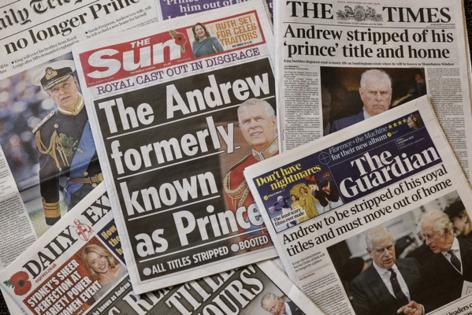Commentary: Britain's arrogance in exporting the disgraced former Duke of York
Published in Op Eds
The British have, at long last, cast away Andrew Mountbatten-Windsor — and rightly so. His shockingly parasitic existence, alleged sexual and financial misconduct, association with Jeffrey Epstein, evasions and astonishing lack of remorse have rendered him an embarrassment even by the indulgent standards of hereditary privilege.
But now, having decided that the former Duke of York is too toxic for domestic consumption, some British journalists seem to believe their country can simply export him, as though other nations exist to absorb the United Kingdom’s unwanted scandals.
Reports suggest that Mountbatten-Windsor, formerly known as prince, is being not-so-quietly encouraged to live abroad — possibly in the United Arab Emirates or another country with a no-extradition treaty. But who, exactly, has been asked? Since when does Britain presume to decide which sovereign nations will host its disgraced aristocrats?
The arrogance is breathtaking. Britain — a nation with some of the world’s strictest immigration controls — made immigration a cornerstone of the Brexit campaign that led to the regrettable vote. Imagine the outrage if another country, say, France or Saudi Arabia, announced it was dispatching one of its disgraced elites to settle in Surrey or the Cotswolds. The British press would erupt in indignation over sovereignty, security and moral standards. Yet somehow, the same logic evaporates when the traffic flows outward. After all, how many ordinary people can simply decide to move to another country without navigating a maze of eligibility rules, visas and restrictions?
This is more than hypocrisy; it is the lingering reflex of imperial entitlement. “We” decide what happens to “our” people — and to everyone else. The rest of the world is expected to nod politely while Britain tidies up its royal embarrassments by relocating them.
But there’s also a practical dimension few seem to have considered: Would it even be safe to let loose abroad? His record suggests otherwise. A man who has so gravely misjudged, who used his privilege to consort with money launderers and predators to enrich himself, and who has shown no credible sign of rehabilitation, is not suddenly rendered harmless by geography. Abroad, he could all too easily engage in further questionable behavior — financial, sexual or both. It is naive to imagine that a change of scenery could transform a lifetime of entitlement into prudence — or that both his family and his country will be safe from further embarrassment, or worse.
And then there’s the unspoken question few seem interested in posing. What exactly has he done to deserve a gifted palace in Abu Dhabi — or anywhere else? The notion that a man stripped of public duties for disgrace should be rewarded with luxury accommodation abroad is grotesque. Accountability should mean facing consequences, not evading them behind the walls of another nation’s hospitality.
Britain’s instinct to send him away reveals something deeper in its political DNA — a habit of displacement rather than reckoning. The same country that lectures others on governance and human rights still treats its own scandals as exportable inconveniences. The monarchy may no longer command an empire, but its moral geography remains imperial.
If Britain truly wants to demonstrate that privilege no longer shields the powerful, it should stop pretending that accountability ends at London Heathrow Airport. The answer is not to exile scandalous public figures in another country; it is responsibility at home. This means launching a real criminal investigation into Mountbatten-Windsor’s dealings as a trade envoy and as Epstein’s close companion — and examining, too, the unexplained millions received by his ex-wife and daughters. Only then will Britain show that even its most protected are not above the law.
Let Mountbatten-Windsor face the consequences where he made them — within the society that enabled him. And let us stop assuming the rest of the world is waiting, hat in hand, to host the United Kingdom’s fallen royals.
Character, like justice, cannot be outsourced.
____
Elizabeth Kosmetatou is a professor of history at the University of Illinois Springfield.
___
©2025 Chicago Tribune. Visit at chicagotribune.com. Distributed by Tribune Content Agency, LLC.
























































Comments